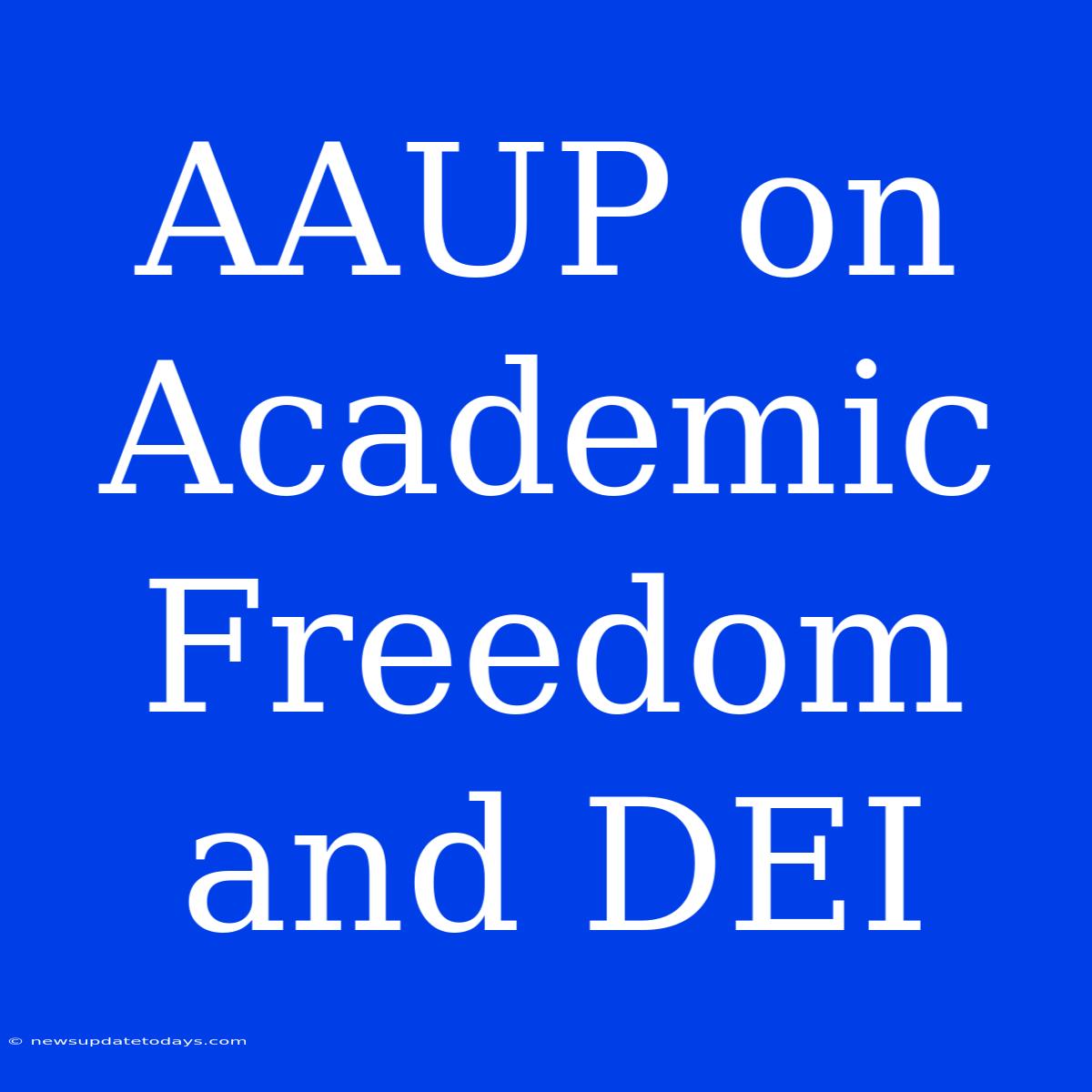AAUP on Academic Freedom and DEI: Navigating the Complex Terrain
The American Association of University Professors (AAUP) plays a crucial role in shaping the discourse around academic freedom and Diversity, Equity, and Inclusion (DEI) initiatives on college campuses. The relationship between these two vital principles is often complex and fraught with tension, necessitating careful consideration and nuanced understanding. This article explores the AAUP's stance on this intersection, highlighting key areas of debate and potential solutions.
Academic Freedom: A Cornerstone of Higher Education
The AAUP has long championed academic freedom as a fundamental tenet of higher education. Defined as the freedom of teachers and students to discuss and explore ideas without fear of censorship or reprisal, it's essential for fostering critical thinking, intellectual inquiry, and the pursuit of knowledge. The AAUP's 1940 Statement of Principles on Academic Freedom and Tenure remains a landmark document, outlining the responsibilities and rights of both faculty and institutions.
Key aspects of academic freedom, as championed by the AAUP, include:
- Freedom of inquiry and expression: Faculty should be free to pursue research and express their views without fear of penalty, even if those views are controversial or unpopular.
- Freedom of teaching: Faculty should be free to determine the content and methods of their courses, subject to reasonable academic standards.
- Protection from censorship: Faculty should be protected from institutional attempts to suppress their research or teaching based on ideological or political grounds.
DEI Initiatives: Promoting Inclusivity and Equity
Diversity, Equity, and Inclusion (DEI) initiatives aim to create more welcoming and equitable learning environments for all students and faculty. These initiatives often involve curriculum reform, faculty training, and efforts to increase representation among underrepresented groups. While crucial for fostering a just and inclusive campus climate, DEI initiatives sometimes raise concerns about academic freedom.
The Intersection: Where Academic Freedom and DEI Converge and Diverge
The potential for conflict between academic freedom and DEI arises when DEI initiatives are perceived as infringing upon faculty's freedom of expression or teaching. For example:
- Required training: Some faculty members have raised concerns about mandatory DEI training, arguing that it can be overly prescriptive or ideologically biased.
- Curriculum changes: The introduction of DEI-focused curricula can be seen as limiting the range of perspectives presented or imposing a particular viewpoint.
- Speech codes: Broadly worded speech codes intended to foster inclusivity can inadvertently restrict free expression and debate.
The AAUP recognizes the importance of both academic freedom and DEI, striving to find a balance that respects both principles. Their approach emphasizes:
- Contextual understanding: The AAUP encourages a careful examination of specific instances where potential conflicts arise, emphasizing a case-by-case approach rather than broad generalizations.
- Robust debate: The AAUP upholds the importance of open and respectful dialogue on controversial issues, even those that touch on sensitive topics related to diversity and inclusion.
- Transparency and due process: The AAUP advocates for transparent processes and due process rights for faculty who feel their academic freedom has been violated.
Navigating the Challenges
The challenge lies in fostering a campus environment where both academic freedom and DEI flourish. This requires:
- Clear policies: Institutions need to establish clear policies that protect academic freedom while promoting DEI goals. These policies should be transparent and consistently applied.
- Open communication: Open communication and dialogue between faculty, administrators, and students are essential for addressing concerns and resolving disputes.
- Shared governance: Shared governance structures, where faculty participate in decision-making processes, can help to ensure that both academic freedom and DEI concerns are adequately considered.
The ongoing dialogue between academic freedom and DEI initiatives is essential for the health of higher education. The AAUP's ongoing engagement with these issues provides vital guidance for universities in navigating this complex terrain and fostering campuses that are both intellectually vibrant and truly inclusive. The key is finding a balance, allowing for robust intellectual exchange while simultaneously creating environments where all members of the community feel respected and valued.

